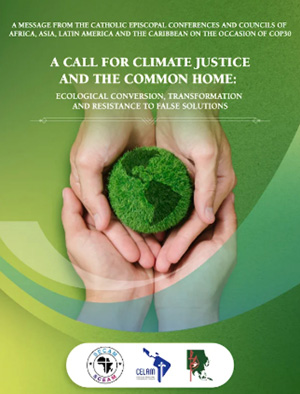A Call for Climate Justice and the Common Home
The 30th United Nations Climate Change Conference, or Conference of the Parties of the United Nations Framework Convention on Climate Change (UNFCCC) more commonly known as COP30, is to be held in Belém, Brazil, from 10 to 21 November 2025. Published below is the Executive Summary of a message from the Catholic Episcopal Conferences and Councils of Africa, Asia, Latin America and the Caribbean on the occasion of COP 30.
 Ecological Conversion, Transformation and Resistance to False Solutions: A path of hope and ecological conversion
Ecological Conversion, Transformation and Resistance to False Solutions: A path of hope and ecological conversion
Inspired by both Laudato Si’ by Pope Francis and Pope Leo XIV’s call to live an integral ecology with justice, we call for a profound ecological conversion. Ten years since the publication of Laudato Si’ and the signing of the Paris Agreement, the countries of the world have not responded with the necessary urgency.
The Church will not remain silent. We will continue to raise our voice alongside science, civil society, and the most vulnerable, with truth and consistency, until justice is done.
I. Our demand
The climate crisis is an urgent reality, with global warming reaching 1.55°C in 2024. It is not just a technical problem: it is an existential issue of justice, dignity and care for our common home.
The science is clear: we must limit global warming to 1.5°C to avoid catastrophic effects. We must never abandon this goal. It is the Global South and future generations who are already suffering the consequences. We reject false solutions such as ‘green’ capitalism, technocracy, the commodification of nature, and extractivism, which perpetuate exploitation and injustice.
Instead, we demand:
- Equity: Rich nations must pay their ecological debt with fair climate finance without further indebting the Global South, to recover losses and damages in Africa, Asia, Latin America and the Caribbean, and Oceania.
- Justice: Promote economic degrowth and phase out fossil fuels, ending all new infrastructure and properly taxing those who have profited from them, ushering in a new era of governance that includes and prioritises the communities most affected by the climate and nature crises.
- Protection: Defend indigenous peoples, ecosystems and impoverished communities; recognising the greater vulnerability of women, girls and new generations; and climate migration as a challenge of justice and human rights.
II. Commitments of the Church
The Church goes beyond words:
- We will defend the most vulnerable in every decision about climate and nature.
- We will educate in integral ecology and promote economies based on solidarity, the ‘happy sobriety’ of Laudato Si’ and the ‘Buen Vivir’ (‘Good Living’) of ancestral wisdom.
- We will strengthen the intercontinental alliance between countries of the Global South to promote cooperation and solidarity.
- We will monitor the results of the COPs through a Climate Justice Observatory.
- We invite a historic coalition between actors from the Global North and South to face the crises in solidarity.
III. Call to action
We urge decision-makers to:
- Fulfil the Paris Agreement and implement NDCs commensurate with the urgency of the climate crisis.
- Put the common good above profit.
- Transform the economic system towards a restorative model that prioritises people’s well-being and ensures conditions for sustainable life on the planet.
- Promote climate and nature policies anchored in human rights.
- Share and implement ethical, decentralised and appropriate technological solutions.
- Achieve zero deforestation by 2030 and restore vital aquatic and terrestrial ecosystems.
- Join forces to strengthen democratic multilateral processes, such as the Paris Agreement, and rebuild trust in cooperation and dialogue, uniting us as humanity, North and South, for the well-being of the planet.
Fruit of the collective discernment of the Churches of Africa, Asia, Latin America and the Caribbean, in preparation for COP30 in the continent of hope, invoking the inspiration of the Holy Spirit and in communion with the mission of the universal Church.


